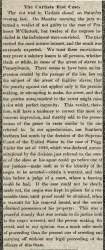Record Data
Transcription
The Carlisle Riot Case
The riot trial in Carlisle closed on Saturday evening last. On Monday morning the jury returned a verdict of not guilty in the case of Professor M’Clintock [McClintock], but twelve of the negroes included in the indictment were convicted. The trial excited the most intense interest, and the result was anxiously expected. We trust these convictions may prove a salutary lesson to all persons, whether black or white, in cases of the arrest of slaves in Pennsylvania. There seems to have been an impression created by the passage of the late law on the subject of the arrest of fugitive slaves, that the penalty against riot applied only to the persons making, or attempting to make, the arrest, and that the parties antagonistical to the arrest might raise a riot with prefect impunity. This verdict, therefore, will have a tendency to correct this most erroneous impression, and thereby add to the preservation of the peace in cases similar to the one referred to. In our apprehension, our Southern brethren lost much by the decision of the Supreme Court of the United States in the case of Prigg-Under the act of 1826, which was declared unconstitutional by the decision just referred to, the owner of the slave or his agent could go before one of our justices− make an oath as to the identity of the negro to be arrested− obtain a warrant, and take him before the judge of a court, where a hearing could be had. If the case could be clearly made out, the negro was kept in prison for a reasonable time, until proof could be obtained, when a warrant for his removal issued, and the owner obtained possession of his property. This was a peaceful remedy that was certain to do justice both to the negro arrested, and the person making the arrest, and in our opinion was a much safer mode of proceeding the present one of arresting and carrying off without any legal proceedings of the officers of this State.


